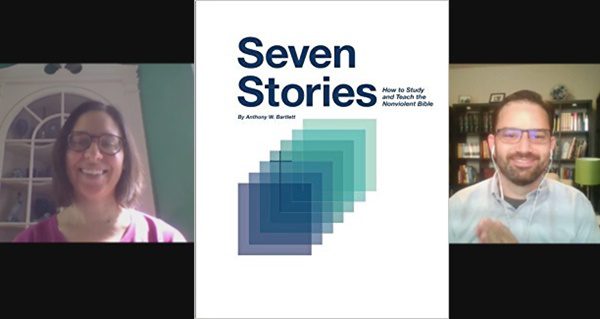In this episode of the RavenCast, Lindsey Paris-Lopez and I discuss the fourth chapter of Anthony Bartlett’s latest book Seven Stories: How to Study and Teach the Nonviolent Bible. You can watch the video of the conversation below, or you can also subscribe to the RavenCast on iTunes, Stitcher Radio, or Podbean.
Show Notes
Introduction
This is our fourth week, so we are on chapter 4 of Tony Bartlett’s book Seven Stories. This chapter is titled, “Wrath to Compassion.” It is the heart of the book as it seeks to transform our understanding of God’s judgment from wrath to compassion.
What does the shift from viewing God as wrathful to compassionate do to us? Understanding that God is love means we live a life of forgiveness and mercy. It should help us be more merciful as we seek justice in the face of sin and evil. It helps us to remember that all people are made in the image of God’s love. So give them the benefit of the doubt.
If we understand God as love, we will stop capital punishment, change culture of law enforcement and treat all people with respect instead of enmity.
Jesus Christ Superstar and the Cup of Wrath
In Jesus Christ Superstar, Jesus take God’s cup of poison/wrath upon himself. Read Lindsey’s article “Drinking the Cup of Poison” for more.
A lot of people see the cross as Jesus’ ultimate separation from God, but we don’t need to interpret it that way. In fact, Jesus says in the Gospel of John that he only does what he sees the Father doing. So, in a mysterious way, Jesus went to the cross because he saw that God was going there with him. Jesus drinks the cup because he sees the Father drinking the cup.
What is the Cup of Wrath?
Cup of wrath is the cup of violence that one nation brings to another. Sometimes in the Bible, God is seen as being behind the cup of wrath that nations bring against one another. But in the Bible, the “cup of wrath” changes from being associated with God to being the human cup of wrath. Jesus drinks the cup of human wrath until it is all gone.
Isaiah 53
Isaiah 53 is not about penal substitutionary atonement. Second Isaiah says, “we accounted him stricken, struck down by God.” This is what we always think. We always think that God is against our enemies and so we account them stricken by God. But Isaiah is revealing this as a misunderstanding of God. God did not strike down the suffering servant or Jesus. Rather, it was our own violence that struck them both down.
Isaiah’s suffering servant responds to being struck down by other people with nonviolence. He doesn’t strike back.
Jesus
The early Christians thought Jesus fulfilled Isaiah’s suffering servant, who refused to respond to violence with violence. Instead, Jesus drank the cup of human wrath and responded with compassion.












